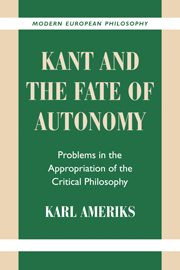Book contents
7 - The Hegelian Critique of Kantian Morality
Published online by Cambridge University Press: 05 June 2012
Summary
Important work on the Hegelian critique of Kantian morality can now be found in at least three different domains. The first is the field of current English-language ethical theory, where after an influential neo-Hegelian attack on Kant by Bernard Williams and others, Kantians have now begun to mount a sharp counterattack. The second is the domain of Englishlanguage Kant scholarship proper, from Paton and Knox to Gregor and Hill, where exegetes have tried diligently but without true popular success to put down the cruder misconceptions about Kant. The third sphere is the German scene, where after the great historical researches of scholars such as Henrich and Schmucker, a number of younger philosophers have attempted to combine traditional exegesis with an extensive systematic and analytic treatment of the Hegelian challenge. I believe it is only by considering all these perspectives together – and by realizing how closely related they are – that we can properly estimate the force and value of Hegel's challenge. As a first step toward such a consideration, I will briefly outline what appear to be the three main points at issue, and then by focusing on one of them, I will show how to a great extent Kant can be vindicated. Obviously, a complete evaluation of this matter must await a thorough examination of Kant's entire practical philosophy as well as an explanation of how Hegel's critique fits in with the general objective of his own massive system.
- Type
- Chapter
- Information
- Kant and the Fate of AutonomyProblems in the Appropriation of the Critical Philosophy, pp. 309 - 337Publisher: Cambridge University PressPrint publication year: 2000
- 2
- Cited by

